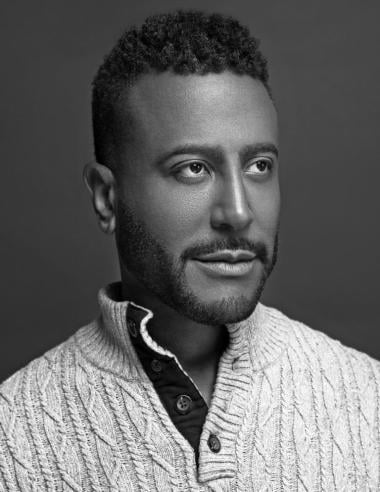
Those who have seen Shakespeare’s The Tempest might not remember any penguins. But Prospero’s Island, a new opera based on the play, has got them, in the form of an eight-member ensemble from the award-winning San Francisco Girls Chorus. “They’re my happy place,” says stage director Phil Lowery of the singers from the chorus’s Level III, under the direction of Terry Alvord. “They’re disciplined, well trained, creative, and fun,” he says. The opera’s cast also includes eight principal singers and a chamber ensemble of woodwinds, strings, piano, and percussion, comprised of players from the local new-music group Ninth Planet, all under the baton of Nathaniel Berman. The world premiere takes place Saturday, March 25 at Herbst Theatre.
As one of Shakespeare’s last plays, The Tempest is about the end of life, with the main character of Prospero (sung here by bass-baritone Andrew Dwan) attempting to secure and define his legacy. In this version, Prospero is not the exiled Duke of Milan but rather a war criminal guilty of conducting horrific experiments on human subjects. But though Prospero has found refuge on a pristine island (here portrayed as the post-war Falklands), in another sense he is still pursued, both by the inner torment of the atrocities he’s committed and by the outer manifestations of those crimes in the form of other characters.
“Ariel and Caliban in the opera are both half-human hybrid products of Prospero’s lab,” says Lowery. “Ariel is half bird, with a beautiful singing voice and the ability to mimic other birds. Caliban, who Shakespeare tells us smells like a fish, is half human and half — spoiler alert — sea squirt.”

The villainous role of Caliban is a departure for baritone Bradley Kynard. “I want him to be sympathetic, not one dimensional or evil,” he says. “And the way they’ve written it, he is sympathetic. He was made this way. Everybody else got the good stuff, so this is what you get!” Finding the physicality of a half human/half sea squirt has been a process as well. “Phil and I realized I never stand up straight,” Kynard says, laughing. “It was an accident; it just happened. I tried to stand up at one point and realized I can’t stand up — I’m not human!”
With a running time of just over an hour and a half (without intermission), the one-night event will be the ninth collaboration between composer Allen Shearer and librettist Claudia Stevens. “As in my other operas, I’ve brought in a lot of different elements,” says Shearer. “It’s not meant to be a totally unified style, but it changes according to where we are in the opera and who’s singing.”
Certain characters from Shakespeare’s original are absent, such as Prospero’s estranged brother Antonio and the offstage diabolical witch Sycorax. “We did have to reduce the number of characters,” Stevens says. “One always does. And some characters have undergone a gender change.” The mystical Ariel (sung here by soprano Shawnette Sulker) is referred to with male pronouns in the original text, but the role has had notable female and male interpreters in the past. Caliban’s male co-conspirators, Stephano and Trinculo, have become Steffi and Trish (sung by Julia Hathaway and Angela Jarosz). Their fun-loving bingeing includes cigarettes and country music.
When it comes to new operas based on existing texts, there are always changes to be made, and this production has updated some of the language that didn’t sit well with the singers. For example, the terms “master” and “slave” have been cut. “When you’re doing anything based on The Tempest,” Lowery says, “it’s going to bring a whole 400-year-old history of how it was back then and everything that has happened historically since.”
Other adjustments have been musical. “It was written for bass or baritone,” Kynard says of the Caliban role. “They had several ossias [alternate passages of notes], so I take the high options, but we had a few moments where they did change things.”

The romance of Prospero’s daughter Miranda (here Mandy, sung by soprano Amy Foote) is also different in this operatic telling. “That is really quite important for this version of The Tempest,” Stevens says. “That she is less of a ninny, less of an ingenue, and becomes a person with real agency and in the end stands up to Prospero and refuses to give him the forgiveness he asks for. Which is important in the context of Holocaust education as well,” she adds. Stevens is the daughter of Holocaust survivors and grew up shielded from her parents’ past, not finding out that they were Jewish until she was 19, a little older than Miranda. “It’s almost impossible to talk about what that experience was like,” she says, “except to say I have given it to Miranda, who was raised in an idyllic environment, and then, in an afternoon, her whole world is changed. She sings the most extended aria about that fact. The themes have to do with the imperative of truth,” says Stevens, who adds that the creators also hope to bring out the theme of respect for the natural world.
Currently in rehearsals at the Dresher Ensemble Studio in Oakland, the production uses a minimal set of various platforms that will be enhanced at Herbst Theatre by Jeremy Knight’s perspective-deepening projections. Knight and Lowery have worked on previous productions with Shearer and Stevens, who are no strangers to tackling classic literary works, having won praise for their version of George Eliot’s Middlemarch as well as Howards End, America, both produced at Z Space, in 2015 and 2019, respectively.
In addition to his composing credits, Shearer has had a long career as a baritone and voice teacher, both privately and at UC Berkeley, of which he is an alumnus. Having also trained at the Akademie Mozarteum in Salzburg, Austria, Shearer brings a singer’s sensibilities to composing. “As always, the word is for me the jumping-off point,” he says, “and how the rhythm and inflection of spoken language translates into music is really the whole process at the beginning.”
“Alan is particularly good at setting conversational English,” says Lowery. “On the page, you’ll see all these meter changes, but once you relax into it, you see that they are actually a direct response to the natural rhythm of the language, so it ends up landing on the ear pretty smoothly and easily.”
As Prospero attempts to orchestrate a happy ending, youthful passions roll along, hopefully resulting in a great night of opera. “We just hope the audience will have a good time and enjoy the humor,” Stevens says. “There’s plenty of humor and plenty of pathos.”



